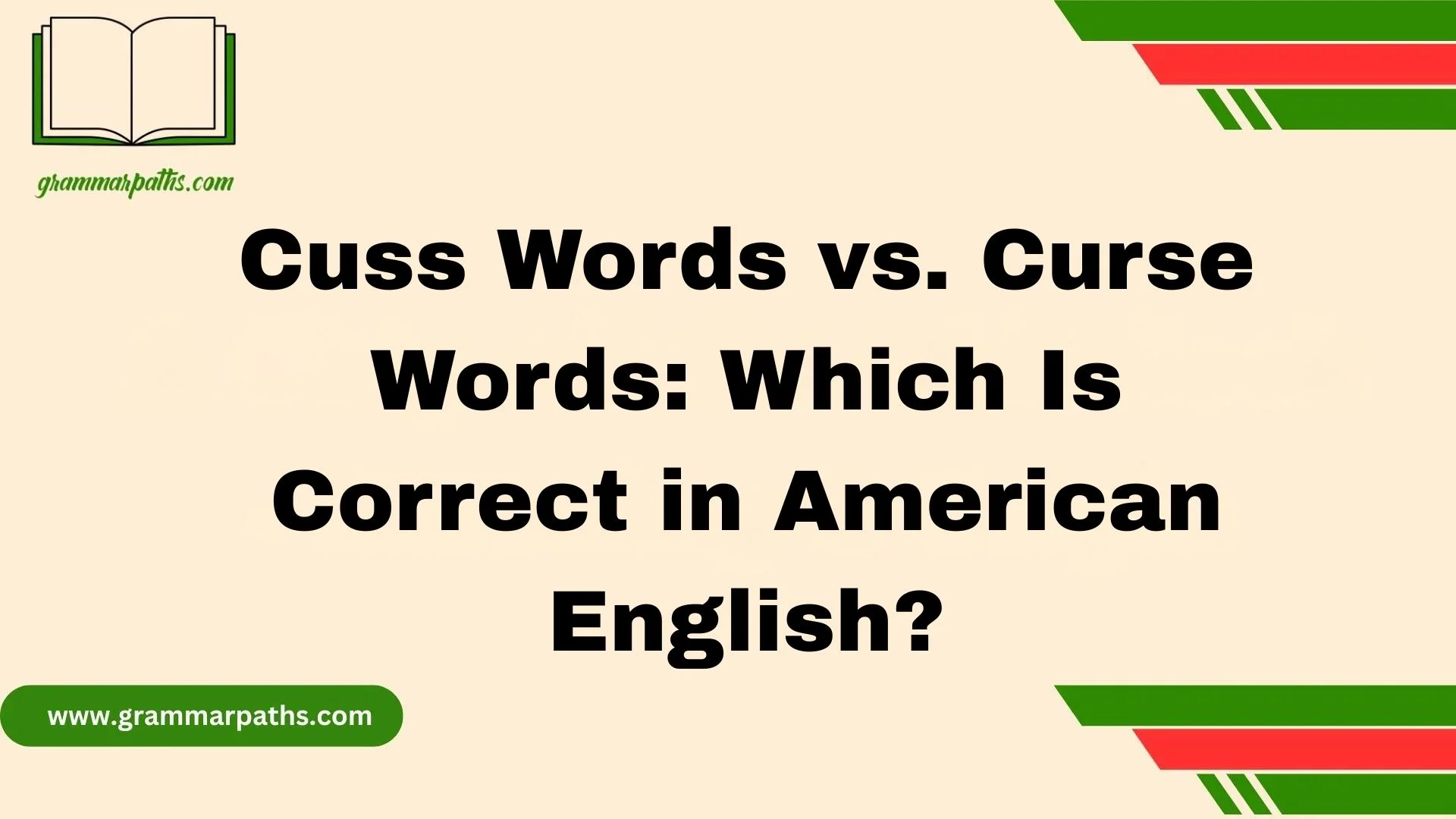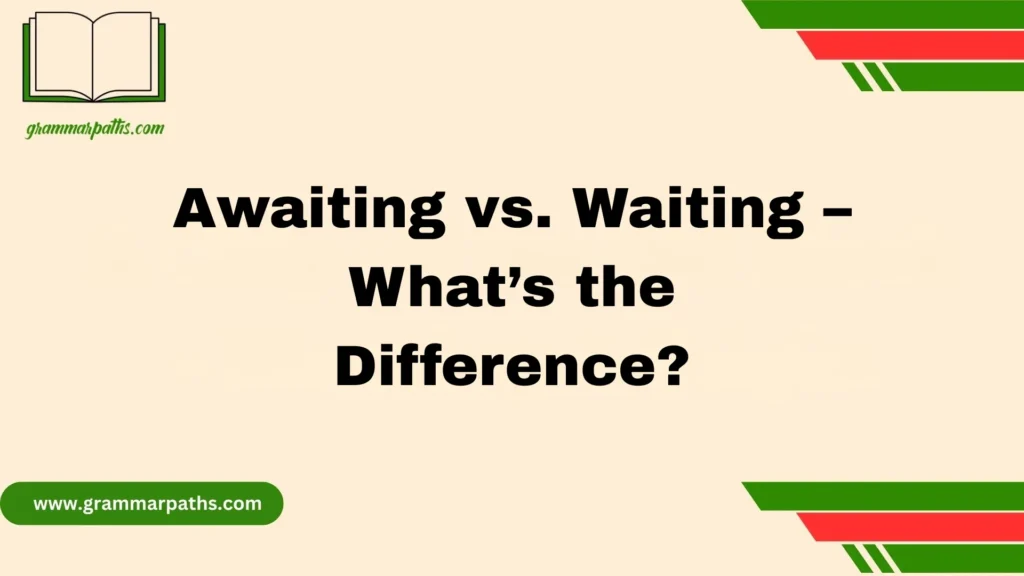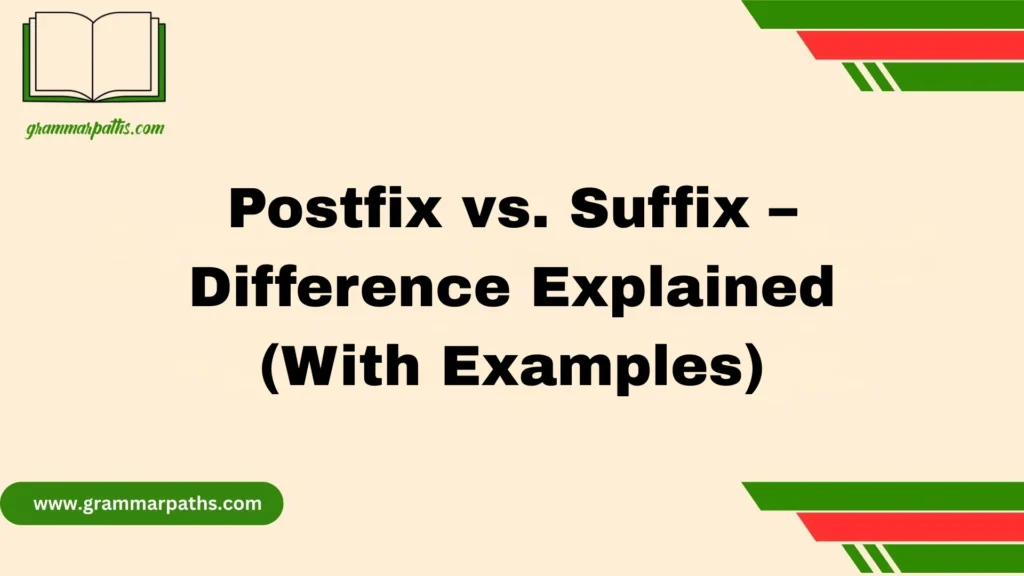I’ve often wondered how many times it might be better to say that someone cussed me out instead of claiming they laid a curse. That tiny shift in semantics creates a real distinction that influences my writing, my tone, and the way it shapes how people view my cultural perception. When I’m working in media, I know that picking the right word or choice directly affects the audience and the impact of any message. In education and work, I see how daily language can frame a lesson, guides my planning, and even carries weight in legal settings, where a single phrase determines what’s appropriate.
In social talks, the way we say things is deeply perceived. The words we pick can show respect or sometimes cause trouble. A strong understanding of which term fits the situation helps me communicate more clearly, avoid awkward mistakes, and gently remind students why the wrong word can block a chance to connect. By keeping conversations smooth, respectful, and aware of the setting, the choice of words makes the message clear, earns trust, and strengthens ties with others.
What Do “Cuss Words” and “Curse Words” Mean?
Before diving into history, let’s get clear on what each term means today.
- Curse words: Profane or offensive language, often tied to taboo subjects like sex, religion, or bodily functions. The word “curse” also has an older meaning—placing a hex or supernatural punishment on someone.
- Cuss words: A dialectal variation of “curse words.” In American English, “cuss” is simply the casual, informal version of “curse.”
Here’s a quick comparison:
| Term | Core Meaning | Common Context | Tone |
| Curse words | Profanity; taboo words | Formal writing, media, academia | Slightly formal |
| Cuss words | Profanity; casual slang | Spoken English, regional speech | Informal, relaxed |
- The teacher warned students not to use curse words in essays.
- He got in trouble for cussing during basketball practice.
So, both mean profanity—but “curse” feels more proper, while “cuss” feels down-to-earth and colloquial.
Origins and Historical Development
The word curse has deep roots in English. It first appeared in Old English as “curs” around the 10th century, meaning an invocation of harm or punishment, usually religious. By the 14th century, “curse” had expanded to describe swearing and blasphemous speech.
Cuss, on the other hand, is uniquely American. It emerged in the early 18th and 19th centuries as a dialectal pronunciation of “curse.” Linguists note that speakers in the South and West often softened “r” sounds, leading to “curse” becoming “cuss.”
Evidence from early American newspapers shows this shift clearly:
- 1770s: “curse” dominated in formal print.
- 1800s: “cuss” appeared in transcriptions of regional speech and literature.
- By the late 1800s: “cuss” was widely understood as casual American slang.
In short: curse came first, but cuss grew out of it as a distinctly American twist.
Evolution in American Vernacular
Language never stands still, and profanity is no exception. Over time, “curse words” kept its more formal, almost old-fashioned feel, while “cuss words” gained traction in everyday conversation.
- 19th century: Writers like Mark Twain used “cuss” to reflect authentic American speech.
- 20th century: Hollywood movies and radio often used “curse” for censorship discussions, while characters said “cuss” in dialogue.
- 21st century: Social media, memes, and comedy shows have blurred the line, but “cuss” still sounds more casual and homegrown.
So when you hear someone say, “He’s a mean old cuss,” you’re witnessing a uniquely American idiom rooted in that history.
Regional & Social Preferences
Which word you use—cuss or curse—depends a lot on where you live, your age, and your social circle.
- South and Midwest: “Cuss” is far more common in everyday speech. Example: “Don’t cuss in front of your grandma.”
- Northeast and West Coast: “Curse” is more likely, especially in schools, media, and workplaces.
- Education level: “Curse words” tends to appear in academic and formal contexts, while “cuss words” pops up in casual conversation.
- Generational gap: Older generations may still say “curse,” but Gen Z and millennials are comfortable with both.
| Region | Preferred Term | Example Usage |
| South (US) | Cuss words | “He cussed me out after the game.” |
| Northeast (US) | Curse words | “Don’t use curse words in essays.” |
| Midwest (US) | Both | Mixed depending on community |
| West Coast | Curse words | “That show had too many curse words.” |
This divide is part of why the debate never fully goes away—both words live side by side.
Cultural and Pop Culture Influence
Pop culture plays a huge role in shaping which term people prefer.
- Hollywood: Movies from the 1930s–50s often used “curse words” in censorship discussions, since it sounded formal. Characters in rural or Southern roles, however, said “cuss.”
- Music: Country and blues often used “cuss,” while rock and pop leaned toward “curse.”
- Comedy & TV: Stand-up comics popularized “cussing” as a humorous way to acknowledge profanity without saying the actual words.
- Social media: Memes and TikToks often use “cuss” because it feels funny, light, and relatable.
A quick Google Trends search today still shows “curse words” as the more searched term, but “cuss words” spikes regionally, especially in Southern states.
Psychological & Emotional Role of Swearing
Why do people swear at all? Psychologists point to several powerful reasons:
- Stress relief: Studies show swearing can lower stress and provide emotional release.
- Pain tolerance: Research by Dr. Richard Stephens found people could keep their hands in ice water longer when swearing, suggesting a neurological benefit.
- Emotional intensity: Swear words carry more punch than ordinary language, making them effective for expressing anger, shock, or humor.
One study from NeuroReport showed that swearing activates the amygdala—the brain’s emotional center—triggering a fight-or-flight response. That explains why shouting a cuss word when you stub your toe feels oddly satisfying.
Linguistic & Sociological Perspectives
From a linguistic view, profanity is fascinating. It reveals what a culture considers taboo, and it evolves as social norms change.
- Religious taboos: Many early curse words were tied to blasphemy.
- Sexual/bodily taboos: Later, words about sex and the body became dominant swear words.
- Social identity: Swearing can create in-groups (“we cuss together”) and out-groups (polite society).
Sociolinguists argue that profanity isn’t just about being rude—it’s a tool for bonding, rebellion, or humor. That’s why phrases like “cussing someone out” mean more than just saying a bad word; they describe social conflict in action.
Legal and Societal Views
Swearing in America sits in a gray area between free speech and social restrictions.
- Broadcasting: The FCC restricts profanity on radio and TV during hours when children might be watching.
- Workplaces: Many companies ban excessive swearing in codes of conduct, especially around clients.
- Legal cases: Courts have sometimes ruled in favor of free speech, but context matters. For example, yelling profanity at police has been defended as free expression, while harassing someone with profane threats can lead to charges.
Case study: In Cohen v. California (1971), the Supreme Court ruled that wearing a jacket reading “F** the Draft”* was protected speech. This landmark case showed that even offensive curse words can be constitutionally defended.
Practical Usage Guidelines
So when should you use “cuss words” vs. “curse words”? Here are some practical rules of thumb:
- In writing: Use curse words for clarity and formality. Example: “The essay contained inappropriate curse words.”
- In speech: Use cuss words in casual settings. Example: “Stop cussing at me.”
- Avoid profanity: In professional, educational, and family-friendly environments.
- Polite conversation: Replace swear words with euphemisms (“freaking,” “darn,” “shoot”).
Teaching Children About Profanity
- Emphasize that words have power and consequences.
- Teach respectful alternatives.
- Model appropriate usage—kids imitate what they hear.
Conclusion
The difference between cuss words and curse words may look tiny, but it carries real weight in how we communicate. In media, education, and social settings, the right word choice can directly affect the audience, impact the message, and determine whether the tone feels respectful or offensive. I’ve often wondered how many times a simple word distinction has shaped my writing or how people view my cultural perception. A strong understanding of this semantics debate helps us avoid awkward mistakes, connect smoothly, and earn trust from others.
FAQs
Q1: Is “cuss” just slang for “curse”?
Yes, “cuss” is an informal or regional way to say “curse,” but in modern American English, they’re often used differently depending on social talks and setting.
Q2: Which term should I use in professional writing?
In education, legal, or media work, it’s usually better to use “curse words,” since it feels more appropriate and professional, while “cuss words” is more casual.
Q3: Why does this distinction matter?
Because language shapes lesson plans, influences how students learn, and can even affect outcomes in legal settings. Choosing the wrong word may block clear communication and cause trouble.
Q4: Can “cussed out” and “cursed” mean the same thing?
Not always. “Cussed out” usually means being yelled at with insults, while being “cursed” can mean someone laid a spell or expressed bad wishes.
Q5: How can I avoid confusion?
By picking the right word for the situation, staying clear, respectful, and adjusting based on the audience. This habit makes your message stronger and keeps conversations smooth.

Emma Brooke is a passionate language expert and contributor at GrammarPaths.com, where she helps learners navigate the complexities of English grammar, idioms, and effective writing. With a strong academic background and years of teaching experience, Emma excels at turning tricky grammar rules into simple, practical lessons that readers can easily grasp.










